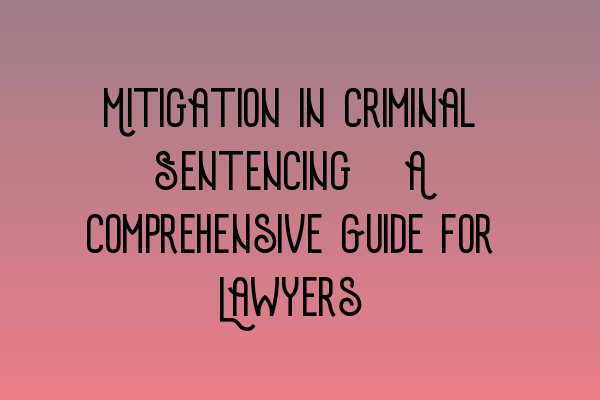Mitigation in Criminal Sentencing: A Comprehensive Guide for Lawyers
As lawyers, it is essential to understand the importance of mitigation in criminal sentencing. Mitigation plays a crucial role in influencing the outcome of a case and can significantly impact the sentence imposed on a defendant. In this comprehensive guide, we will explore various aspects of mitigation and provide valuable insights for lawyers.
What is Mitigation?
Mitigation refers to the process of presenting evidence or arguments to the court with the aim of reducing the severity of a sentence. It is an opportunity for lawyers to highlight factors that might justify a more lenient punishment or provide relevant context to the defendant’s actions. Effective mitigation can make a significant difference in the final outcome of a case.
Understanding the Sentencing Guidelines
When developing a mitigation strategy, it is crucial to have a thorough understanding of the relevant sentencing guidelines. These guidelines provide a framework for judges to determine appropriate sentences based on the nature and severity of the offense. By familiarizing yourself with the guidelines, you can tailor your mitigation efforts accordingly and advocate for a fair and proportionate sentence.
Types of Mitigation Evidence
There are various types of evidence that can be presented in mitigation, each serving a specific purpose. These include:
- Character references: testimonials from family, friends, colleagues, or community members that highlight the defendant’s good character.
- Remorse or rehabilitation: evidence demonstrating the defendant’s remorse for their actions or efforts to rehabilitate themselves.
- Personal circumstances: details about the defendant’s personal life, such as their upbringing, mental health, or any other factors that might provide context for their actions.
- Cooperation with authorities: evidence that the defendant has cooperated with law enforcement or assisted in the investigation.
By carefully selecting and presenting relevant evidence, you can effectively persuade the court to consider a more lenient sentence.
The Importance of Effective Advocacy
Mitigation is not just about presenting evidence; it is also about effective advocacy. Lawyers must skillfully articulate their arguments and present mitigation evidence in a compelling manner. This requires strong oral and written communication skills, as well as an ability to connect with the court and present a persuasive case.
Legal representation for Delaware LLCs in the UK and legal challenges for UK businesses in the U.S. can often involve complex criminal cases where effective mitigation is crucial. As an experienced criminal law firm, SQE Criminal Law & Practice Law UK can provide expert advice and representation in these matters.
Working with Experts
In some cases, it may be necessary to work with experts to strengthen your mitigation case. Experts can provide professional opinions or testimony that can add weight to your arguments. For example, in cases involving mental health issues, an expert psychiatrist could provide valuable insights into the defendant’s condition and its impact on their behavior.
At SQE Criminal Law & Practice Law UK, we understand the significance of expert testimonies in building strong cases. Our team has experience collaborating with experts in various fields to ensure that our clients receive the best possible representation.
Adapting Mitigation Strategies
Every case is unique, and mitigation strategies must be adapted accordingly. What works in one case may not work in another. It is essential to consider the specific circumstances, the nature of the offense, and the defendant’s background when developing a mitigation strategy. By tailoring your approach, you can increase the chances of achieving a favorable outcome for your client.
Seek Professional Guidance
Mitigation is a complex area of criminal law that requires expertise and experience. As a lawyer, it is crucial to stay updated with the latest developments and guidance on effective mitigation strategies. By continuously educating yourself and seeking professional guidance, you can enhance your ability to advocate for your clients effectively.
If you’re preparing for the SQE exam and looking for essential study materials, make sure to check out SQE Exam Prep: Essential Study Materials for Aspiring Solicitors for helpful resources and guidance.
In conclusion, mitigation plays a significant role in criminal sentencing. By understanding the process, preparing compelling arguments, and presenting relevant evidence, lawyers can effectively advocate for fair and proportionate sentences. With expert advice and representation from SQE Criminal Law & Practice Law UK, you can navigate the complexities of mitigation and secure the best possible outcome for your clients.
